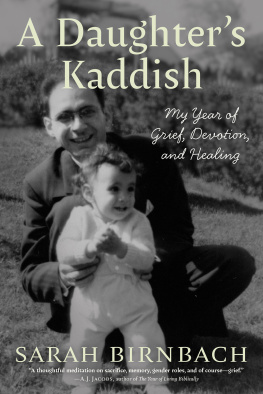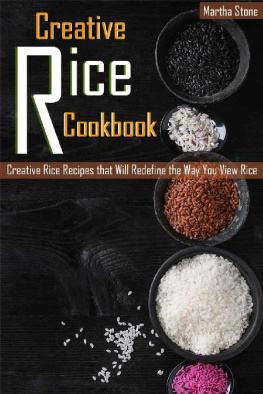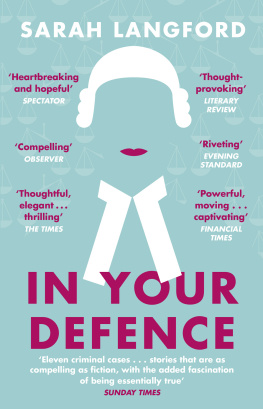Paperback edition, 2016
1989 by the University of Georgia Press
Athens, Georgia 30602
www.ugapress.org
All rights reserved
Designed by Sandra Strother Hudson
Set in Linotron 10 on 14 Monticello
Most University of Georgia Press titles are available from popular e-book vendors.
Printed digitally
The Library of Congress has cataloged the hardcover edition of this book as follows:
Rice, Sarah, 1909
He included me : the autobiography of Sarah Rice / transcribed and edited by Louise Westling.
XVI , 181 p., [8] p. of plates : ill. ; 24 cm.
ISBN 0-8302-1141-3 (alk. paper)
I . Rice, Sarah, 1909. 2. African AmericansAlabamaBiography. 3. African AmericansFloridaBiography. 4. African AmericansSouthern StatesSocial life and customs. 5. AlabamaBiography. 6. FloridaBiography. 7. Southern StatesSocial life and customs1865 I. Westling, Louise Hutchings. II. Title.
EI 85.97. R 53A 3 1989
975.9060924dc19
[ B ] 88-38690
CIP
Paperback ISBN 978-0-8203-4978-7
Title page photograph: Sarah with students, early 1930s
Contents
ONE
Early Days in Clio and Birmingham (19091917)
TWO
Life in the Batesville Neighborhood (19171920)
THREE
Life on the Pat Brannon Place (19211925)
FOUR
Teaching Career and Marriage (19251929)
FIVE
Hard Times and Florida Debut (19291933)
SIX
Settling in Jacksonville (19371943)
SEVEN
Home on Castellano (19471956)
EIGHT
Get Up and Live! (1956)
Preface
At the beginning of Invented Lives, Mary Helen Washington questions why the traditions of black culture seem to be predominantly masculine and asks, How does the heroic voice and heroic image of the black woman get suppressed in a culture that depended on her heroism for its survival? However they may have been suppressed, the voices and images of these black women have begun to emerge in the past decade and to fill out the whole story of the black experience in America. Sarah Lucille Webb Rice is a remarkable woman whose life story is a significant addition to this record.
Born in rural Alabama in 1909, she was the third child of a young schoolteacher named Lizzie Janet Lewis Webb and her husband, Willis James Webb, a minister in the African Methodist Episcopal church. From an early age, she worked with the rest of her family to wrest a living from a small sharecropping farm, raising cotton and corn, field peas, greens, and other garden vegetables on which their survival depended. She went to school as far as it could take a black child in those days, through the ninth grade, and then began teaching in rural Alabama schools herself. She married a handsome farmer and became a mother, but that first marriage did not work out. Then a long span of hard times began with the depression. These took her eventually to Florida, where she had to become a worker in private homes to support herself and her son. Eventually she met and married Andrew A. Rice, a good and devout man who was her companion until his death in 1983. In the years since her move to Jacksonville, Florida, in the late 1930s, she has won a respected place for herself in her community, as a political leader, as a major figure in her church on the statewide level, and as the confidante and wise friend of white employers as well as her own extended family and wide circle of black friends. Her courage, her integrity, her dignity, her generosity, and her robust humor pervade the story she tells of her life.
He Included Me is an oral narrative that is part of a tradition reaching back at least two hundred years in North America. The tradition actually began on another continent, with African storytelling, but was first recorded on our shores in slave narratives told by those who escaped from southern bondage before the Civil War. The most famous of these is of course Frederick Douglasss Narrative, and its plot structure is typical in the way it recapitulates the narrators physical journey up through adversity to freedom and some measure of success. In our own century such leaders as Booker T. Washington (Up from Slavery, 1900) and James Weldon Johnson (Along This Way, 1934) continued to see their lives in this black Horatio Alger pattern. But these men were unusual among their people in being able to write their stories and have them published commercially. Literacy set them apart from the vast majority of black Americans and involved them in a literary mode dominated by white men and white idioms.
The most vital currents of narrative art in black culture have been oral, and this stream of verbal tradition began to be collected by folklorists, sociologists, and anthropologists during the early decades of the century when black writers like James Weldon Johnson, Jean Toomer, and Langston Hughes were learning to capture their cultural heritage in poetry and fiction. The WPA projects of the 1930s recorded the accounts of former slaves telling their life stories, while at the same time many of the musical forms of black narrative and poetry sung by such folk artists as Robert Johnson and Huddie Ledbetter were being recorded in sound studios. Most of these examples of oral tradition were brief or fragmentary in form, however, and although they preserved valuable cultural materials, they did not include sustained narratives of individual lives.
Then came the social upheavals of World War II and the civil rights movement. In 1969 a Harvard graduate student named Theodore Rosengarten met Ned Cobb, an eighty-four-year-old survivor of twelve years of imprisonment for activities associated with the Alabama Sharecroppers Union. A collaboration between the two men produced a remarkable oral autobiography that became a model for the newly developing genre of oral history. Rosengarten worked with Ned Cobb for two years, in thirty-one recording sessions adding up to more than one hundred hours of taped stories. He also interviewed other members of Cobbs family. Then he pieced the recorded materials together, arranging them chronologically and editing for clarity and historical interest. The resulting narrative, All Gods Dangers (1974), spans three generations and, as Rosengarten explains in his preface, provides a black, nonfiction counterpart to William Faulkners fictional chronicle of white rural life of the same period in the Souths social history. Although All Gods Dangers resulted from an unusual collaboration between an illiterate, rural black storyteller and an educated, urban white listener, it was an enterprise not without precedent. White listeners had also played a role in the production of slave narratives during the abolition movement in the middle of the nineteenth century. Often they wrote down the oral stories of illiterate slaves, but the two most celebrated examples involved escapees who could read and write. William Lloyd Garrison performed a mediating and supporting role in the evolution of Frederick Douglasss autobiography, and Amy Post and Lydia Maria Child encouraged Harriet Jacobs to write and publish Incidents in the Life of a Slave Girl










